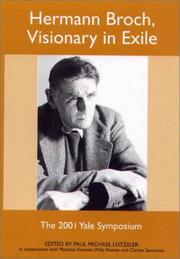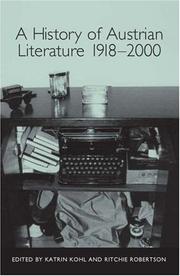| Listing 1 - 6 of 6 |
Sort by
|
Book
Abstract | Keywords | Export | Availability | Bookmark
 Loading...
Loading...Choose an application
- Reference Manager
- EndNote
- RefWorks (Direct export to RefWorks)
Drama in German --- Austrian writers --- 1900-1945 --- Texts
Book
Year: 1900 Publisher: Berlin : Insel,
Abstract | Keywords | Export | Availability | Bookmark
 Loading...
Loading...Choose an application
- Reference Manager
- EndNote
- RefWorks (Direct export to RefWorks)
Drama in German --- Austrian writers --- 1900-1945 --- Texts
Book
ISBN: 2213029091 Year: 1998 Publisher: Paris : Fayard,
Abstract | Keywords | Export | Availability | Bookmark
 Loading...
Loading...Choose an application
- Reference Manager
- EndNote
- RefWorks (Direct export to RefWorks)
Austrian writers --- Hofmannsthal, Hugo von, --- Composers --- Librettists --- Compositeurs --- Librettistes --- Correspondence --- Correspondance --- Strauss, Richard, --- Correspondance. --- Strauss, Richard --- Hofmannsthal, Hugo von --- Opera --- Germany --- 20th century --- 78.17 Strauss --- Muziekgeschiedenis --- Brieven --- Duitsland --- 20e eeuw
Book
ISBN: 9781571133878 1571133879 9781571138002 9781571134745 1571134743 9786612947018 1571138005 128294701X Year: 2008 Publisher: Suffolk Boydell & Brewer
Abstract | Keywords | Export | Availability | Bookmark
 Loading...
Loading...Choose an application
- Reference Manager
- EndNote
- RefWorks (Direct export to RefWorks)
Austria was not the only European country whose old order disintegrated in the early twentieth century, giving way to the crisis of modernity, nor the only country whose literature bears the marks of this crisis. But modernity's onset was experienced differently in Austria: in the words of Karl Kraus, it served as 'laboratory for the fall of world civilization.' This book examines the crisis as reflected in fiction written by Robert Musil, Joseph Roth, and Ingeborg Bachmann between 1920 and 1970. After examining the elusive concept of modernity, Malcolm Spencer looks at the responses of the three authors to the central themes of modernity: fragmentation, nationalism, the end of empire, and ambivalence. Chapters on Musil examine his understanding of the 'ancien régime' in Austria and his analysis of the ideological stage of modernity. Spencer then considers Roth's more negative reaction, showing the post-imperial novel 'Radetzkymarsch' to be a nostalgic response to the collapse of Habsburg Austria and the rise of fascism. The final chapter looks again at the end of empire, not in the work of writers who lived through it, but through that of one who experienced it as a historical and cultural legacy: Ingeborg Bachmann. Malcolm Spencer is a Teaching Fellow at the University of Birmingham.
Austrian literature --- History and criticism. --- Musil, Robert, --- Roth, Joseph, --- Bachmann, Ingeborg, --- Ambivalence. --- Austrian Writers. --- Bachmann. --- Crisis of Modernity. --- End of Empire. --- Fragmentation. --- Gendered Notion. --- Musil. --- Nationalism. --- Political and Social Concerns. --- Roth.

ISBN: 1571132724 1571136312 9781571136312 9781571132727 Year: 2003 Publisher: Rochester, N.Y. Camden House
Abstract | Keywords | Export | Availability | Bookmark
 Loading...
Loading...Choose an application
- Reference Manager
- EndNote
- RefWorks (Direct export to RefWorks)
The Austrian novelist Hermann Broch ranks with Kafka and Musil among the three greatest 20th-century Austrian novelists and belongs to the century's most gifted novelists in German from whatever country. He established his reputation with 'The Sleepwalkers', a trilogy of political and philosophical novels. His best-known work is 'The Death of Virgil', a long, challenging work in a lyrical, exuberant, and sometimes nearly incomprehensible style, a kind of cerebral stream-of-consciousness of the dying Virgil. Broch also wrote extensively about modern art and architecture, Hofmannsthal, and mass psychology. He has a special connection to Yale, as he lived the last years of his life there after having escaped Austria in 1938. The participants in the Yale Symposium of April 2001 are among the world's most prominent Broch scholars. Fourteen of their presentations have been extensively revised for this volume, which focuses on Broch as critic and as novelist and dramatist. Topics include Broch's views on kitsch and art, and on drama; his cultural criticism; his cooperation with Borgese and Arendt; his theory of mass psychology; history in his works, Ernst Kretschmer's influence on him; 'Virgil' and Celan's 'Atemwende'; Jean Starr Untermeyer's translation of 'Virgil'; guilt and the fall in 'Those without Guilt'; and Broch reception in Japan. PAUL MICHAEL LüTZELER is Distinguished University Professor of German at Washington University St. Louis and editor of Broch's collected works. MATTHIAS KONZETT is associate professor of German at Yale; WILLY RIEMER is associate professor of German at the University of Delaware, and CHRISTA SAMMONS is curator of the German collections of the Beinecke Library at Yale.
Broch, Hermann --- Broch, Hermann, --- Criticism and interpretation. --- Brokh, Kherman, --- Brokh, German, --- Broh, Herman, --- ברוך, הרמן --- LITERARY CRITICISM / European / German. --- 20th-century Austrian writers. --- Austrian novelist. --- Broch reception. --- Hermann Broch. --- Mass psychology. --- The Death of Virgil. --- The Sleepwalkers.

ISBN: 1281949191 9786611949198 1571136703 1571132767 Year: 2006 Publisher: Rochester, NY : Camden House,
Abstract | Keywords | Export | Availability | Bookmark
 Loading...
Loading...Choose an application
- Reference Manager
- EndNote
- RefWorks (Direct export to RefWorks)
New essays examine 20th-c. Austrian literature in relation to history, politics, and popular culture. 20th-century Austrian literature boasts many outstanding writers: Schnitzler, Musil, Rilke, Kraus, Celan, Canetti, Bernhard, Jelinek. These and others feature in broader accounts of German literature, but it is desirable to see how the Austrian literary scene -- and Austrian society itself -- shaped their writing. This volume thus surveys Austrian writers of drama, prose fiction, and lyric poetry; relates them to the distinctive history of modern Austria,a democratic republic that was overtaken by civil war and authoritarian rule, absorbed into Nazi Germany, and re-established as a neutral state; and examines their response to controversial events such as the collusion with Nazism, the Waldheim affair, and the rise of Haider and the extreme right. In addition to confronting controversy in the relations between literature, history, and politics, the volume examines popular culture in line with current trends. Contributors: Judith Beniston, Janet Stewart, Andrew Barker, Murray Hall, Anthony Bushell, Dagmar Lorenz, Juliane Vogel, Jonathan Long, Joseph McVeigh, Allyson Fiddler. Katrin Kohl is Lecturer in German and a Fellow of Jesus College, and Ritchie Robertson is Taylor Professor of German Language and Literature and a Fellow of The Queen's College, both at the University of Oxford.
Austrian literature --- Politics and literature --- Popular culture --- Publishers and publishing --- History and criticism. --- History --- Book publishing --- Books --- Book industries and trade --- Booksellers and bookselling --- Culture, Popular --- Mass culture --- Pop culture --- Popular arts --- Communication --- Intellectual life --- Mass society --- Recreation --- Culture --- Literature --- Literature and politics --- Publishing --- Political aspects --- 20th-century Austrian literature. --- Austrian writers. --- Waldheim affair. --- authoritarian rule. --- civil war. --- collusion with Nazism. --- drama. --- extreme right. --- lyric poetry. --- modern Austria. --- popular culture. --- prose fiction. --- rise of Haider.
| Listing 1 - 6 of 6 |
Sort by
|

 Search
Search Feedback
Feedback About UniCat
About UniCat  Help
Help News
News